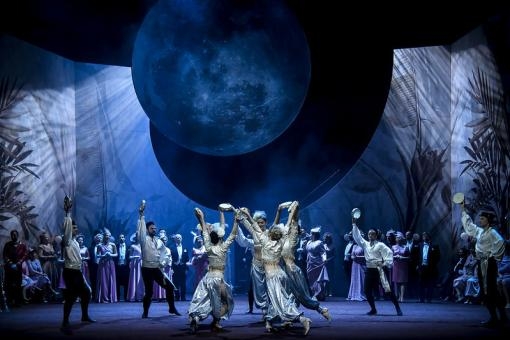Lehár’s “The Merry Widow” is one of the most famous operettas in the world and will replace Oskar Nedbal’s “Polish Blood”, which represented this genre in Brno for several seasons. Choreographer Martin Pacek will appear as a director for the first time at the Brno National Theatre. Director Magdalena Švecová, conductor Jakub Klecker, and designers Zuzana Přidalová and David Janošek participated in the creation of the operetta production together with Pacek.
The same production team has already staged an extraordinary production of Ferda the Ant and La bohème. Audiences can look forward to the magic of Paris at the turn of the century with all its scenic and musical splendour, and to the singing cast featuring Jana Šrejma Kačírková and Veronika Rovná as Hanna Glawari and Jiří Hájek and Roman Hoza as Danilo. Jan Šťava and Jiří Sulženek will play Baron Mirko Zeta, and they will be joined by their drama colleagues Pavel Čeněk Vaculík and Martin Veselý, who will play the role of Secretary Njegus. The premiere is announced for Friday, 3 February 2023 at 19:00 at the Janáček Theatre.
“Every operetta is interesting because it contains more than a single discipline: there is singing, spoken word, dance, and an artistic component, and we try to fill in all of this so that the operetta remains an operetta. On the other hand, we have taken the liberty of translating the concept a little into a more contemporary optic, and that could make our production interesting. Visually, we were inspired by Parisian carrousels and VIP parties,” says Magdalena Švecová, the director of the production, and Martin Pacek adds: “The genre of the comic operetta has always been a great attraction for the audience – especially if Franz Lehár and his brilliant music are a kind of superstructure. For the acting itself, we based our preparation on French and Italian comedies and silent grotesques.”
Austrian composer Franz Lehár’s operetta about the need to marry off the widow Hanna Glawari, but tactically to still keep her millions in the Principality of Pontevedra, returns to the Brno stage after thirty years. The work, for which librettist Leo Stein found the theme by chance in a book during a visit, became a ticket to fame for the young Lehár. The plot is suitably romantic and full of witty subplots – a number of suitors are vying for the young widow Hanna Glawari, but the ambassador of the Principality of Pontevedra in Paris has to arrange for her to marry the right man – that is, in terms of the principality’s economy. The task is assigned to Count Danilo, but what the ambassador doesn’t know is that he and Hanna already have a romantic history.
They share a mutual affection, but they also share a reluctance to admit that the old flame hasn’t flickered out. When you add the other ingredients of a party hosted by the Pontevedra embassy in a Paris hotel, dancers from the famous Maxim’s cabaret, and witty dialogue, you have everything you need for a great operetta.
Franz Lehár, Hungarian on his mother’s side and Moravian on his father’s side, probably had a flair for melody, swing, and wit thanks to his mixed family heritage. Each number of The Merry Widow is like a little musical candy, and tunes like Maxim’s, The Song of Vilja, Women, and others quickly became famous. The Merry Widow also made Lehár famous, and today his operetta is part of the repertoire of the Metropolitan Opera in New York.













No comment added yet..